| Srl | Item |
| 1 |
ID:
111653
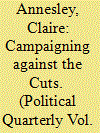

|
|
|
|
|
| Publication |
2012.
|
| Summary/Abstract |
The Coalition's economic strategy poses a significant threat to gender equality in the UK. In the absence of committed gender equality advocates in the government, campaigning is, again, from the outside. This article presents some of the new strategies developed by individuals and organisations such as the Women's Budget Group and the Fawcett Society to fight against the cuts and considers the effectiveness of their approaches.
|
|
|
|
|
|
|
|
|
|
|
|
|
|
|
|
| 2 |
ID:
111659


|
|
|
|
|
| Publication |
2012.
|
| Summary/Abstract |
The credit rating agencies that dominated the ratings of mortgage-backed securities were Moody's and Standard & Poor's. The two agencies rated some 4.3 trillion dollars of bonds as triple AAA, yet within a period of 18 months these same rating agencies downgraded these bonds to below investment grade. This paper seeks to show that the ratings agencies business model, the issuer pays approach, led to major conflicts of interest with both the ratings agencies unable to walk away from a rating. The evidence given by analysts to Congressional Inquiries confirms a cultural revolution within the rating agencies, with analysts feeling unable to question the quality of a rating. Analysts who were described as being awkward by issuers were removed from the rating process. In the meantime, the income for the rating agencies increased from 3 billion dollars to 6 billion dollars, with the CEOs of the rating agencies receiving incomes comparable to the incomes to the CEOs of investment banks.
|
|
|
|
|
|
|
|
|
|
|
|
|
|
|
|
| 3 |
ID:
111662
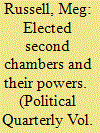

|
|
|
|
|
| Publication |
2012.
|
| Summary/Abstract |
In May 2011, Britain's Conservative/Liberal Democrat coalition government published proposals for reform of the House of Lords. In a White Paper and draft bill they set out detailed plans for a largely or wholly elected second chamber. These marked the latest stage in a long-running debate on Lords reform. The government's proposals aim to change the composition of the second chamber, suggesting that there will be no change to its powers or the conventions governing relations with the House of Commons. But this expectation has been disputed. The House of Lords presently does not make full use of its powers, and many anticipate that it would if its members became elected. This paper reviews the composition of all second chambers internationally, showing that wholly directly elected chambers make up the minority, and that both mixed chambers and indirect election are common. It then reviews the formal powers of all largely and wholly elected chambers. This shows that amongst parliamentary systems the formal powers of the House of Lords are relatively great. But second chamber powers, as well as their composition, vary widely.
|
|
|
|
|
|
|
|
|
|
|
|
|
|
|
|
| 4 |
ID:
111660
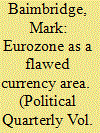

|
|
|
|
|
| Publication |
2012.
|
| Summary/Abstract |
The European single currency system has come under unprecedented strain during the past three years and there is little reason to assume that this will diminish, in any significant way, in the near future. This article briefly explores the background to the current eurozone crisis before outlining a number of potential solutions. Specifically, we discuss how the credit crunch induced recession of 2008 triggered the problems within the eurozone regarding sovereign debt, looking at the issues of spill-over and free-rider effects, together with the implementation of EMU fiscal rules. The analysis is then extended by outlining a series of potential remedies. This consists of a critical evaluation of solutions that the EU has already instigated (i.e. moral persuasion, financial relief measures and debt default), together with a series of alternative propositions (i.e. fiscal federalism and a European Clearing Union) and even the collapse of the euro.
|
|
|
|
|
|
|
|
|
|
|
|
|
|
|
|
| 5 |
ID:
111666
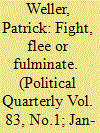

|
|
|
|
|
| Publication |
2012.
|
| Summary/Abstract |
Prime ministers often have to work with prime ministerial aspirants, senior ministers who regard themselves as possible successors. But can these challengers seize the job when the prime ministers are reluctant to stand down? Using evidence from Canada, Britain and Australia, the article explores the conditions in which successions have taken place and the capacity of the prime ministerial aspirants to expedite the process. It identifies three alternative strategies that are shaped by the party rules in the different countries. The aspirants may flee, fight or fulminate. Which strategy will best improve their chances of winning the top job depends on the traditional or developing modes of leadership election that their parties have adopted. Some processes provide the means to assassinate the leader. Others have no opportunity to act; rivals can do nothing but wait, either in or outside parliament. The article finds that the broader the constituency that elects the leaders, the more secure those leaders are when their reputation declines.
|
|
|
|
|
|
|
|
|
|
|
|
|
|
|
|
| 6 |
ID:
111654


|
|
|
|
|
| Publication |
2012.
|
| Summary/Abstract |
Although often ignored by practitioners and academics alike, gender matters in both politics as a practice and politics as a subject of study. This article systematically demonstrates how both the practice and study of politics are gendered in ways that lead to an over-representation of men. It also argues that both are intertwined in significant ways that need to be unravelled, but also that important changes have taken place in both over the last 30 years. The article goes on to highlight some of the challenges that remain and ends by outlining some of the key themes that should be an important part of an on-going agenda to improve politics as a practice and as a discipline.
|
|
|
|
|
|
|
|
|
|
|
|
|
|
|
|
| 7 |
ID:
111648
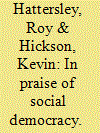

|
|
|
|
|
| Publication |
2012.
|
| Summary/Abstract |
This article makes the case for social democracy in the context of difficult national and international economic conditions and changes in domestic politics that see a Conservative-dominated Coalition government and the Labour party in Opposition for the first time since 1997. It rejects much current thinking in the Labour party and instead argues that traditional social democratic values, such as equality and social justice, are of contemporary relevance and can only be achieved through a strong central state committed to those values.
|
|
|
|
|
|
|
|
|
|
|
|
|
|
|
|
| 8 |
ID:
111667
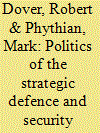

|
|
|
|
|
| Publication |
2012.
|
| Summary/Abstract |
This article examines the politics of the October 2010 Strategic Defence and Security Review (SDSR), focussing on the points of difference between the main political parties (and within the Cameron coalition government) and the political dynamics of the review process. In examining how the government's core mission to reduce the country's 'historic deficit' impacted on the review process and outcomes, we are also able to highlight the practical results of a political philosophy that is currently being implemented across Whitehall. We argue that defence is a path-finding policy area for a new kind of post-industrial bureaucratic environment typified by a 'thin-client' and 'smart customer' function that interacts with industry.
|
|
|
|
|
|
|
|
|
|
|
|
|
|
|
|
| 9 |
ID:
111657
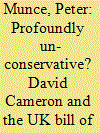

|
|
|
|
|
| Publication |
2012.
|
| Summary/Abstract |
This article considers David Cameron's proposal to repeal the Human Rights Act (HRA) and replace it with a British Bill of Rights. Cameron's proposal has been heavily criticised by a range of political, academic and non-state actors and was described by a current senior Coalition Cabinet member as 'xenophobic' and 'legal nonsense'. This article takes a slightly different direction to those lines of attack and critique that have been developed of the Conservative's proposals. The central proposition of the article is that Cameron's proposal is profoundly un-Conservative at two levels. Firstly, at the level of Conservative approaches to constitutional reform and secondly, at the level of Conservative political philosophy.
|
|
|
|
|
|
|
|
|
|
|
|
|
|
|
|
| 10 |
ID:
111665


|
|
|
|
|
| Publication |
2012.
|
| Summary/Abstract |
Alec Salmond's SNP, old politics and fingertips, won a landslide. The Lib Dems, free to confine the Tory plurality, chose the wooden spoon of office.
|
|
|
|
|
|
|
|
|
|
|
|
|
|
|
|
| 11 |
ID:
111649


|
|
|
| 12 |
ID:
111650


|
|
|
| 13 |
ID:
111651


|
|
|
| 14 |
ID:
111652


|
|
|
| 15 |
ID:
111658
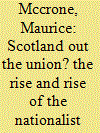

|
|
|
|
|
| Publication |
2012.
|
| Summary/Abstract |
The election of the Scottish National party as a majority government in 2011 is as challenging to the British state as it was unexpected. While explanations for SNP success focused on Labour's faulty campaign and poor leadership, the last half-century has seen the rise and rise of the nationalist agenda in Scotland. Scotland's politics are now more different from England's than at any time since the 1950s. The Scottish parliament is the effect of that change rather than its cause, while party competition between Labour and the SNP north of the border has shifted political gravity centre-left in contrast with England. It is not inevitable, however, that Scots would vote for Independence in a referendum. Nevertheless, Scotland is a more semi-detached country than at any point in the history of the Union, and the future of the British state, at least in its present form, cannot be taken for granted.
|
|
|
|
|
|
|
|
|
|
|
|
|
|
|
|
| 16 |
ID:
111656


|
|
|
|
|
| Publication |
2012.
|
| Summary/Abstract |
In February 2011 the UK Parliament passed an Act that both reduced the number of MPs to be elected to the House of Commons and significantly altered the rules for the definition of Parliamentary constituencies. After six redistributions in which organic criteria-MPs representing places with a community of interest-dominated the redrawing of constituency boundaries, the new rules gave precedence to an arithmetic criterion: all constituencies must have electorates within 5 per cent of the national quota (average). Seven months later the Boundary Commission published its initial proposals for a new set of 502 constituencies implementing these new rules. This paper evaluates the amount of change to the country's electoral map that this involves, identifies the main features of the new constituency configurations, and assesses their likely impact on UK political life.
|
|
|
|
|
|
|
|
|
|
|
|
|
|
|
|
| 17 |
ID:
111655


|
|
|
|
|
| Publication |
2012.
|
| Summary/Abstract |
In the aftermath of the August 2011 riots, politicians and commentators offered a range of explanations for the social unrest and wanton violence. Drawing on survey and focus-group data, this paper investigates those explanations by analysing how socio-economic, normative and political factors shape contemporary attitudes towards law breaking in Britain. The paper finds that both economic deprivation and personal moral values help to explain attitudes toward illegal behaviour, but citizens' mistrust of political leaders and their disengagement from public affairs are also an important factor. The findings suggest that politicians who want to provide moral leadership need to do so through their actions as well as their words.
|
|
|
|
|
|
|
|
|
|
|
|
|
|
|
|
| 18 |
ID:
111664


|
|
|
|
|
| Publication |
2012.
|
| Summary/Abstract |
The recent rises in food prices represent the 'tip of the iceberg' and a 'canary in the mine' moment for world agriculture. They are underlain by a continuing 'race to the bottom' and speculative process whereby systems of resource production and exploitation are continuing to rely upon 'infinite supply' assumptions and narrow technological solutions to 'feeding the world'. I argue here that these conditions are leading to a dominant policy framing that tends to marginalise diverse and place-based agro-ecological systems by creating a new legitimacy for bio-economic rather than eco-economic solutions. Government and policy-making bodies need to redefine and widen their approaches to agriculture and agri-food in ways that recognise its social, cultural, political and spatially diverse contribution in a post-carbon world.
|
|
|
|
|
|
|
|
|
|
|
|
|
|
|
|
| 19 |
ID:
111661
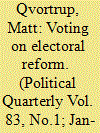

|
|
|
|
|
| Publication |
2012.
|
| Summary/Abstract |
Referendums on electoral systems are relatively rare. In most countries changes to the electoral system are enacted through the legislatures. The British referendum in May 2011 is thus one of the rare examples. In this article it is shown that the apparently idiosyncratic factors in the referendum were consistent with general trends identified in other referendums. While the media focused on the harshness of the campaign, the referendum also resulted in surprising coalitions between long-term foes, thus suggesting that the referendum contributed to cross-party cooperation rarely seen in a majoritarian system like that of Great Britain.
|
|
|
|
|
|
|
|
|
|
|
|
|
|
|
|
| 20 |
ID:
111668


|
|
|
|
|
| Publication |
2012.
|
| Summary/Abstract |
This article explores the United Kingdom's National Security Strategy (NSS) since 2008, considering what the NSS discloses about how contemporary Whitehall conceptualises 'risks' to Britain. It contends that rather than being a strategy in the Clausewitzian sense, the NSS represents a political exercise in risk management. In addressing a range of quite different problems, the NSS suggests that those in Whitehall now conceive their role as being to shield the citizen from any conceivable threat to their safety, wellbeing, and even emotional security. Yet this constitutes a highly expansive vision, and elevates the state's provision of public goods to a potentially unmanageable level.
|
|
|
|
|
|
|
|
|
|
|
|
|
|
|
|